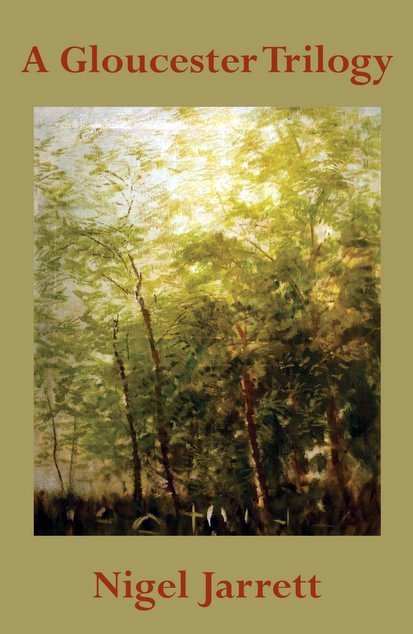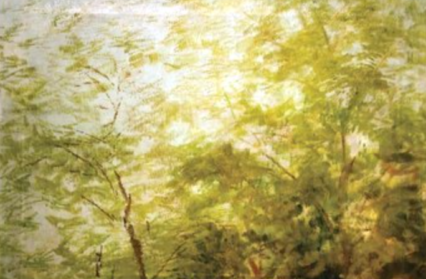Welsh writer Nigel Jarrett explores the background to A Gloucester Trilogy, his pamphlet of stories published this month and his prize for winning the inaugural Templar Shorts award. The stories are set in and around the Forest of Dean.
In Partonopier und Meliur by the medieval German poet Konrad von Würzburg, the forest is a transitional and transformative space in which the personalities of his characters are shaped. Chivalry flourished in the adventures of knights and their courtly kin, but so did the need to survive and eventually escape the forest entanglements, leaving behind the tournaments as receding clashes of arms on ground in what was otherwise an all-enveloping, labyrinthine, and often menacing vastness. Partonopier und Meliuris a romance. Its author was influenced by the idea of wilderness as an emblem of conflict. Today, its 21,000 verses and plot complications seem as impenetrable as the forest he chose as his iconic greenwood, in which the 13-year-old Partonopier, a Tristan lookalike, kills a wild boar.

Many of the fairy tales written by the Grimm brothers, such as Little Red Riding Hood, Sleeping Beauty, and The Frog Prince, take place in clearings surrounded by forestry into which one ventures at one’s peril, though even at the time von Würzburg was writing about, inroads had to be made so that travel and sustenance could be rendered possible. Survival at its most basic level depended on them, and still does.
In the 1990s I was living on the edge of Wentwood Forest, what remains today of the Duke of Beaufort’s ancient hunting lands (to shunt its long history further forward). From the top of Mynydd Llwyd (Grey Hill) looking south, more of its remnants can be seen above the Caldicot Levels: coagulated clumps of trees which were once of a piece in a seemingly endless canopy. Wentwood is the forest mentioned in the Mabinogion which King Arthur approaches from Usk in the tale of Gereint, son of Erbin. There’s a megalithic alignment on Mynydd Llwyd, and the lost ruins of the 14th-century Cas Troggy can be found in an overgrown copse near Pen-y-Cae Mawr.
But on Friday, May 10, 1996, as a newspaper journalist on a day off, I was enjoying the sunshine at Llanvaches. A mile away, some drugs dealer from Newport was being assassinated in a Wentwood clearing. He was shot and his body set alight by two rivals from the city’s narco underworld. It was a pre-meditated act, the journey to the forest being ostensibly to discuss a drugs exchange. Transitional, transformative, transactional. One might say the act was perpetrated in broad daylight if the light in a forest were ever broad. The previous Sunday I’d walked across that same clearing on a forest hike. Later, when living in Chepstow, I became aware of another immense woodland, the Forest of Dean. The England-Wales border slithers invisibly along the bed of the River Wye, and on its English bank, the Forest advances, like a behemoth come to water.
I knew about the Forest of Dean from my grandfathers, who were once miners in Cwmbran, on the edge of the South Wales coal field. The Forest was a mining area, too. I often visit. At an elevated picnic site and looking right to a towering cliff, I got the idea for a story called Christ, Ronnie, Christ, about an amnesiac who witnessed the spectacular suicide of a woman leaping to her death. It won the inaugural Templar Shorts award, organised by the celebrated poetry publisher, then making a return to fiction. Part of the prize was the publication of a story pamphlet to include the winner. In A Gloucester Trilogy, it’s the central one, linked to the others. In each, the forest and its environs figure heavily: Inspector Rossington’s Casebook is a strange recollection by a retired Forest detective; and Missing, the final story, is a tale of a Forest novelist’s career going horribly wrong. I say no more. A reader more perceptive than I said the stories grew in density, like a walk into the forest’s depths.
Circles are completed and re-cycle. Those clearings, unless tended, will return to the wild. Boar have re-appeared in the Forest of Dean and are breeding (but not being killed with counterparts of Partonopier’s spear – yet). The forest as sustaining, living, breathing entity has re-asserted its importance as the Amazon burns. A few UK forests, including the Dean, are locations for al fresco sculpture parks, many of whose works seem like appeasements to the sylvan gods. The forest’s existence as giver of life and hoarder of secrets, now and then terrible, is a powerful trope that continues to inspire and disturb.
‘Why are trees so big?’ I once asked my father when I was a child living on a council estate in Pontnewydd which had been built on land reclaimed from a wood. ‘They just are,’ he said, at a loss to explain. The wood ended at the bottom of our garden, robbed, as it were, of its rightful domain but shaking its protest of leaves, conkers and the odd storm-snapped branch into our New Jerusalem plot. We played inside it as kids. Once, hiding from the others in a hazel copse, we were confronted by a local farmer whose lands bordered the wood and who believed he owned it; he startled us by parting the branches and standing there, a cruciform silhouette, like an unappeased god come for reparation.
As writers we are the heirs of Grimm and von Würzburg, seeking the meaning of life in the forest’s thickets of mystery, throwing reason against the claims of the irrational, knowing that if everything and everyone were reasonable there’d be little to write about.
A Gloucester Trilogy is published by Templar Poetry at £6 (templarpoetry.com), or from the author at nigel.duncan@btopenworld.com (07949 473 689)
Nigel Jarrett is a former daily-newspaperman, the winner of the Rhys Davies Prize for short fiction, a regular contributor to Wales Arts Review, and the author of five books, including the widely-praised story collection, Funderland.



 Enjoyed this article? Support our writers directly by buying them a coffee and clicking this link.
Enjoyed this article? Support our writers directly by buying them a coffee and clicking this link.








